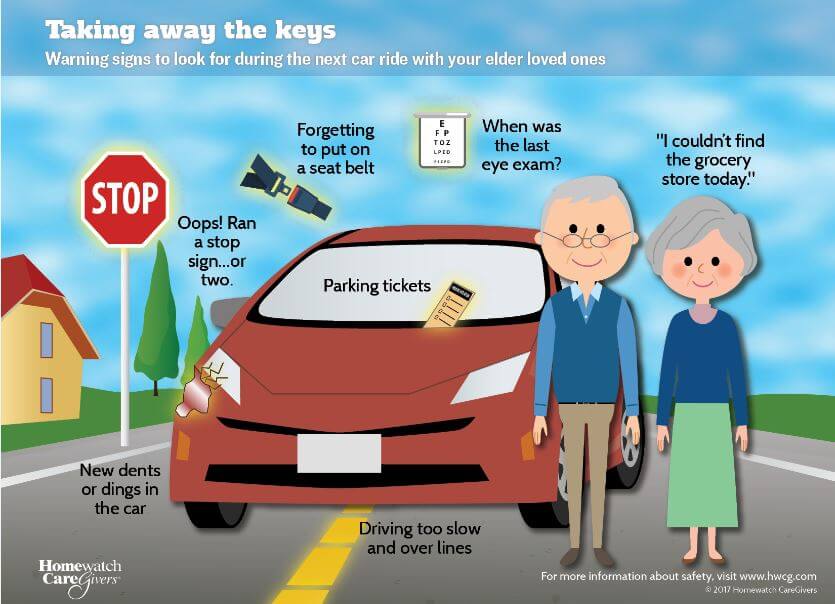No one wants to lose their independence, but there comes a time when someone may be a danger to themselves or others and difficult conversations and choices have to happen. Driving is often a critical part of independence so that people can continue to run errands like going to the doctor or buying food or just socializing.
According to AAA, a not-for-profit organization of motor clubs serving more than 55 million members in the United States and Canada, 33 million licensed drivers were over age 65 in 2009 (a 20% increase from 1999). They estimate that by the year 2030, 70 million Americans in the U.S. alone will be over age 65 and 85 to 90 percent of them will be licensed to drive. Now consider that AAA also reports that, “with the exception of teen drivers, seniors have the highest crash death rate per mile driven, even though they drive fewer miles than younger people.”

Take Heed
You don’t have to be a private detective to notice the signs that your Mom or Dad might be one of the seniors who “are outliving their ability to drive safely by an average of 7 to 10 years,” according to AAA.
What’s not a sign that a person can no longer drive themselves: age. There is no magic number.
Look for:
*more dings and scratches on their car
*tickets or warnings for driving
*complaints of getting lost on familiar routes
*if you can join them for a drive, notice if they are being honked at by other drivers or seem disoriented
“Not a single one of those warning signs is necessarily a trigger, but the more you see, the more your Mom or Dad should be reviewed by a health care professional,” said Jacob Nelson, the director of Traffic Safety Advocacy & Research with AAA. “[These signs] should serve as a wake-up call for all of us. If we’re concerned about Mom or Dad, we have a legal obligation to do something about it.”
Before you begin any conversation about driving concerns, Nelson recommends going for a drive—with Mom or Dad at the wheel.
Time for a Chat
After your drive, if you have concerns, plan to talk with them about possible solutions.
“The earlier this conversation happens, the better,” he said. “‘It can go like this, 'Hey Mom and Dad, you’re fine right now, but can we talk a little bit about how you’d like to handle the situation in the future?’ That way, Mom and Dad can contribute to that plan and they play a role in how the situation will be handled.”This shouldn’t be an intervention with all family gathered around to confront someone, but rather one spokesperson speaking on behalf of everyone who is worried or potentially involved in a solution.
“Remember to always keep the conversation on mobility,” Nelson said. “You might say, ‘How can we keep you going to the places you need to go, but do so in a way that may or may not include driving?’ If the focus is not on removing independence from that person, it’s much easier.”
If you, as the adult child, are not available to serve as back-up transportation, then come prepared to the discussion with the results of research on alternative transportation for your loved one. Options may include local bus service, in home care providers, and taxi-like services such as Lyft or Uber.
Speak to Their Bottom Line
While there might be a cost to relying on services for transportation, let your loved one know that there are costs to continued risky driving. According to Nelson, savings can be in the thousands, possibly from no longer paying for auto insurance or car maintenance.
Of course, the ultimate expense is in protecting lives.
“Let them know, ‘you could hurt not only yourself, but you could hurt other people. What happens if you hurt someone else and they sue?’,” he says. “Let them know of their liability.”
Make It Official
Don’t hesitate to involve a medical professional in your mission to take away the keys from your loved one to keep them and others safe.
“The more folks that can be involved in monitoring the health status of an older individual, the better off it will be,” Nelson said. “We want people to talk to their doctors about their fitness to drive.”
Another bonus is that this takes the whole topic off of your shoulders and makes it more official, perhaps less emotional. Their challenges with driving may be related to a side effect from medication, a specific medical condition or something else that should be addressed by a medical professional.
“If my Mom or Dad were diagnosed with dementia there would no longer be a question of if they need to stop driving someday, it’s a question of when,” Nelson said.
Ultimately, it’s not about taking away the keys or independence but about well-being. “This isn’t about getting people off the road,” he said. “It’s about maintaining safety.”
When you get together with family only once or twice a year, it can be a surprise to see how they are doing. In some cases, they might have new friends, activities or plans. In other scenarios, an elder loved one may have some new challenges.
Driving a car requires a constellation of skills coming together: good eyesight, knowledge of rules of the road, ability to react quickly and stay alert. As people age, live with a chronic illness or experience side effects from medications, these driving skills can be affected and even impaired.
Take a look at our infographic for some of the warning signs that it might be time to take away Mom or Dad’s car keys. If any of these apply to your loved one, consider doing the following:
- Have a conversation in which you express concern and provide facts. You may want to schedule an appointment with their health care provider to get an authoritative third party involved.
- Talk about how driving safely affects not only the driver but everyone else on the road—it’s not just about them.
- Research transportation alternatives from local bus service to professional in-home care, then share this information.
Take a closer look at this infographic to learn more about the warning signs to look for when in the car with an elderly loved one.






